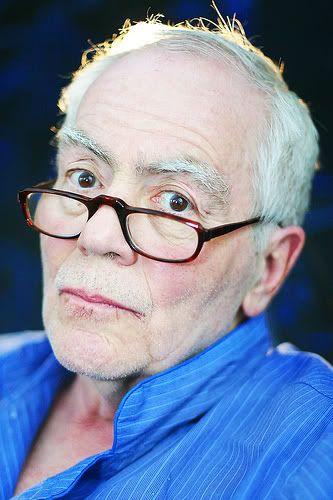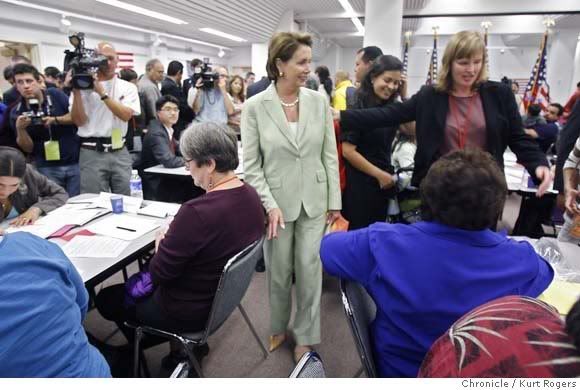Chief Justice John G. Roberts Jr. was rushed to a hospital here Monday afternoon after suffering a seizure at his summer island home, a Supreme Court spokeswoman said.
Sen. Arlen Specter (R-Pa.), who chaired the hearings, told CNN on Monday night that senators were told about the previous episode but did not find it serious enough to ask Roberts about.
Roberts, 52, fell on a dock after having a "benign idiopathic seizure," said Kathleen Landin Arberg, the court's public information officer. She said that Roberts has "fully recovered from the incident" but that he would remain at Penobscot Bay Medical Center here overnight for observation.
Arberg said that the chief justice, who has presided over the court for two terms, received minor scrapes from the fall but that a "thorough neurological evaluation . . . revealed no cause for concern."
She said he experienced a similar event in 1993 but had no recurrence until Monday.
Seizures are any sudden, abnormal electrical activity in the brain. While some are focused in one part of the brain, others can be generalized. Not all seizures involve convulsions. Arberg's description of a benign idiopathic seizure indicates an episode whose origins are unknown.
Newsweek reported in November 2005 that Roberts suffered a seizure in January 1993 while golfing. "It was stunning and out of the blue and inexplicable," Larry Robbins, a Justice Department colleague, told the magazine. Robbins said Roberts was not allowed to drive for several months after the seizure and took the bus to work. The magazine quoted a senior White House aide as describing the episode as an "isolated, idiosyncratic seizure."
There is no record of any discussion of the 1993 seizure or of Roberts's health in general during his confirmation hearings. Sen. Arlen Specter (R-Pa.), who chaired the hearings, told CNN on Monday night that senators were told about the previous episode but did not find it serious enough to ask Roberts about. Roberts has no known history of major illness.
Roberts, the youngest member of the Supreme Court, took office as chief justice in September 2005 after being nominated by President Bush to replace the late William H. Rehnquist.
Roberts's seizure occurred around 2 p.m., Arberg said, when he was stepping off a boat after doing errands near his home on Hupper Island, which is about halfway up the Maine coast.
Hupper Island is part of the village of Port Clyde, which is contained in the town of St. George, according to Town Manager John M. Falla. He said that the island is not connected to the town by bridge, and that Roberts was brought by private boat to the mainland and taken by ambulance to the hospital, about 20 miles away.
St. George Fire Chief Tim Polky told the Associated Press that Roberts was "conscious and alert when they put him in the rescue [vehicle] and took him to Penobscot Bay Medical Center."
The chief justice was admitted by an emergency room doctor and seen by Judd Jensen, a staff neurologist, said Chris Burke, the hospital's director of marketing and communications.
He said Roberts was "aware and alert" when he arrived at the community medical facility, which is nestled among trees on the edge of Rockport, a picturesque Maine village about 90 miles northeast of Portland. He declined to say what the chief justice's full neurological evaluation entailed.
Burke said some of Roberts's aides had visited the hospital more than a year ago, when the chief justice bought the nearby vacation home. "Folks came by and checked out the facilities. That's a normal precaution for anyone in his position," he said.
Burke said he thinks doctors consulted with Roberts's regular physicians in the Washington area during the chief justice's evaluation.
Roberts was resting in a regular patient room on Monday night and had some friends with him, Burke said.
"Most seizures last from 30 seconds to two minutes and do not cause lasting harm," according to background information posted online by the National Institute of Neurological Disorders and Stroke, part of the National Institutes of Health. "However, it is a medical emergency if seizures last longer than 5 minutes or if a person has many seizures and does not wake up between them."
While seizures can be the result of a brain disorder such as epilepsy, the institute notes that they can also be a consequence of fevers, head injuries or even medication side effects.
Roberts and his wife, Jane Sullivan Roberts, bought the Hupper Island house last summer from Steve Thomas, former host of the PBS home-improvement series "This Old House."
The Bangor Daily News reported last year that the house is about 225 feet from shore, with a right of way to the beach and a water view toward Port Clyde General Store on the mainland. The island has 20 to 30 homes and more than a mile of shoreline.
When Roberts was confirmed by the Senate on Sept. 29, 2005, by a vote of 78 to 22, he became the youngest chief justice in more than 200 years and the third-youngest ever to assume the office.
Since the court adjourned in late June, Roberts has taught at a law school summer program in Europe and attended an international judicial conference in Paris. He was back in Washington last week, and on Friday left work early to attend a party celebrating his daughter's seventh birthday. The Robertses have two young children.
Roberts was originally nominated to succeed Justice Sandra Day O'Connor, who announced in July 2005 that she was retiring. But upon Rehnquist's death, Bush decided to make Roberts his nominee for chief justice and later nominated Samuel A. Alito Jr. to replace O'Connor.
This is one more example of Democrats' failure, dereliction of duty, in checking the damage that Bush and Republicans have inflicted on the nation. John Roberts's nomination never should have gotten passed out of the Senate Judiciary Committee. Roberts's seizure history would not have, nor should it have, eliminated him from serving on the highest court in the land. But failing to get Roberts on the record about his health history, under oath, demonstrates Democrats' inept efforts to block the Bush administration's agenda. Democrats rolled over for John Roberts' confirmation when there was abundant evidence that he was ideologically unsuited for the court. Patrick Leahy, Russ Feingold, Herb ("I will vote my hopes today and not my fears") Kohl all voted to pass Roberts's name out of committee and on.
For a lifetime seat on the U.S.S.C., Herb, you vote your fears.
As Joe Biden said when he voted against Roberts, "He will have more impact on our lives, in the future of our children's lives, than any of us and all of us combined."
These Democratic Senators voted to confirm Roberts: Max Baucus, Ben Nelson, Mark Pryor, Ken Salazar, Byron Dorgan, Herb Kohl, Patrick Leahy, Patty Murray, Jeff Bingaman, Jay Rockefeller, Bob Byrd, Tom Carper, Bill Nelson, Ben Johnson, Herb Kohl, Kent Conrad, Mary Landrieu, Ron Wyden, Chris Dodd, Blanche Lincoln, Joe Lieberman and Carl Levin.
Democrats consistently fail to convince Americans because Democrats don't even try.





